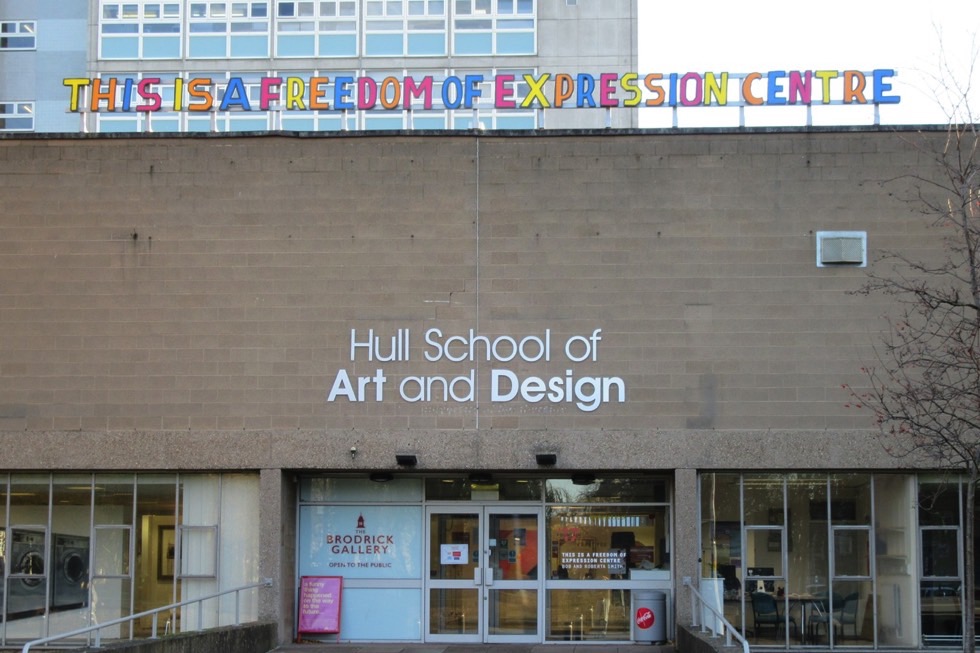What’s Happening To Hull School Of Art & Design?

With news of 85% staff cuts, hot on the heels of the city’s first year as UK City of Culture, Paul Collinson considers the tragic demise of Hull’s 157 year old art school. Will it recover from a £10m million deficit? And without it, just where are the next gen of cultural producers going to come from?
One of the consequences, intended or otherwise, of Derry-Londonderry being the first UK City of Culture in 2013 was the loss of its only practice-based art school. Named VOID Art School, the artist-led project had been running since 2006 to address the lack of Higher Education provision in the city. By giving students accreditation through professionally supported arts practice in the VOID studios, it successfully propelled alumni forward into HE education elsewhere in the UK.
However, ahead of Derry-Londonderry’s tenure as UK City of Culture, VOID abandoned its specialist art school and adopted a broader access programme, now called VOID Engage. So this left the UK’s first City of Culture back in its original situation, with limited Further Education courses and no HE route.
In Hull, the UK’s second City of Culture, there were no such imperatives from City of Culture 2017 Ltd. Rather, the danger of losing its HE art provision came from corporate education itself. Founded in 1861, Hull School of Art & Design (HSAD) was effectively abandoned in 2006 by its then parent institution, the University of Lincoln, after it had cherry picked the courses for relocation at its home site in Lincoln.
This seemed a sad and premature end for HSAD, whose alumni have always gone on to achieve successes in their chosen fields. The graduates that stayed in Hull provided the annual intake for the city’s artists’ studios and created their own infrastructure and networks. Organisations such as Hull Time Based Arts, RED Gallery, Hull Art Lab, Kingston Art Group and The Boathouse were all started by former students of HSAD. Indeed, many alumni went back to teach at their alma mater.
There seemed to be good news in 2007. Hull College Group adopted HSAD and relocated their art provision into the abandoned HSAD site in the city centre. The college had always delivered Further Education courses in art and design alongside Foundation Degrees and HNC/HNDs for the city’s students. New specialist courses were introduced, such as photography, journalism, and architecture, and became three year BA Honours degrees. The Foundation Degree courses were eventually dropped in 2013. At that time, financial and managerial over-reaching by Hull College Group, along with diminishing funds for FE from government, meant poor financial performance and a decline in market share by the Group overall. So the ongoing under-investment in HSAD, along with poor marketing of the historic HSAD brand by way of being subsumed by Hull College’s HCUK brand, also meant an unfair financial and performative burden was being placed on HSAD staff and resources, who were receiving good QAA performance reviews.

By 2016, Hull College Group’s performance was so poor that it had to make a request for Exceptional Financial Support (EFS). This meant a review by the Skills Funding Agency, which referred the ‘financial health’ of the Group to the FE Commissioner for investigation. The then Chief Executive resigned and his Deputy became the Chief Executive, ex officio, last year. The FE Commissioner’s December 2016 report finally showed just how poorly Hull College Group had managed itself: accruing a budget deficit of over £10 million during the previous four years – despite receiving public funding. The Group had tried to offset this deficit through year-on-year staff cuts, and attempts at asset sales. Damningly, the report concluded that there were “no recommendations for improving provision for students of all ages”.
So now to 2018. Despite recently receiving a £54 million EFS award for a Fresh Start recovery plan – believed to be the highest ever bailout given to an English college – ideas from current management so far include cutting student contact time with HSAD staff from 15 hours per week to 8 hours, supplemented by on-line learning; reintroducing the two year Foundation Degrees; plus the most savage of staff cuts – and this with the warning that there will be further annual budget deficits of £1 million. This has been supported by a Board of Governors who have overseen years of poor management at Hull College Group and the current demise of HSAD.
Currently, out of a total of 40 support and teaching staff at HSAD, 35 have taken the voluntary redundancy package offered rather than waiting for the axe – that’s an 85% reduction in one go. It’s looking like there will be two more weeks of strike action. Those students who are currently studying are taking legal advice on the change of contact times and teaching arrangements they originally agreed to, and have paid tuition fees for. Potential HSAD students, already offered places, are now going elsewhere.
During Hull’s 2017 UK City of Culture celebrations, HSAD gladly adopted the moniker “Freedom of Expression Centre”, given to it by artist Bob & Roberta Smith through the Look Up commissioning programme. This would be comic if not so tragic in how the number of student and staff lives are affected by a culture of uncertainty. Indeed, the FE Commissioner reports that there is effectively a culture of staff being unable to “communicate concerns to management” without being penalised – some “freedom of expression” centre.
Following the positivity of 2017, city and business leaders at strategic level have had to acknowledge (at last) that the arts can be an economic driver, as well as a cause for change in outlook and well-being in its city’s residents and visitors. The irony is that Hull’s main provider of creative training, and the well-spring of future practitioners, does not. Hull College Group’s current £54 million Fresh Start appears to be a continued, short-sighted way of ‘bean counting’ that has brought about the current calamity, and is a firm rejection of any possible alternative.
The sad fact will be that in its second year as UK City of Culture, Hull, like Derry-Londonderry, might lose its valuable HE arts provision, and in so doing will give up on a critical investment in the city’s cultural future. Without urgent political intervention, locally and nationally, the city will lose Hull School of Art & Design. Is this the legacy we want?
Paul Collinson is an artist who lives and works in Hull. He graduated from Hull School of Art & Design in 1991. He will be exhibiting work as part of the Independents Liverpool Biennial 2018 at the Corke Gallery
Hull College Group’s latest statement, dated 5 March 2018, can be read here
Images courtesy Paul Collinson, placards and banners created by staff and students of Hull School of Art & Design





